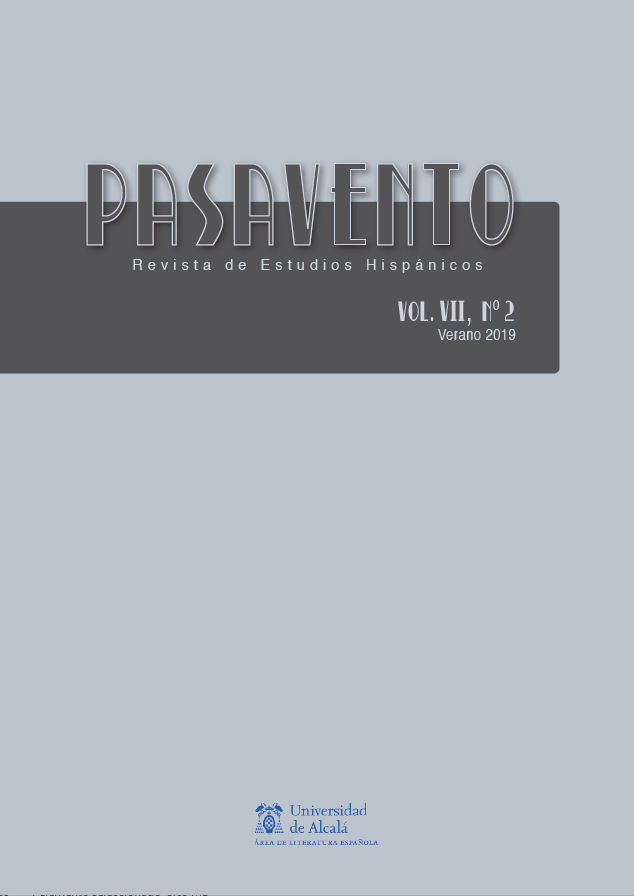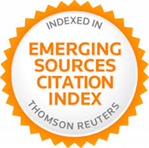Absence in Olvido García Valdés’ "Y todos estábamos vivos"
DOI:
https://doi.org/10.37536/preh.2019.7.2.733Keywords:
Poetry, Absence, Memory, Language, IdentityAbstract
This essay analyzes the idea of absence in Olvido García Valdés’ Y todos estábamos vivos (2006). The German philosopher and critic Hans-Georg Gadamer said that “the literary critic today faces the challenge of being able to identify, in contemporary creation, and amongst a myriad of imitations which are formally correct, the truly original, solid, and productive” (1999: 144). This article takes as a point of departure these words by Gadamer to analyze the place where García Valdés’ poems come from: the evaporated, scattered, lost. Following this idea, absence is suggested as the main theme giving solidity to these poems where it is present on four different axioms or parameters: (1) time, (2) language, (3) space, and (4) memory. Examining each of these parameters separately, but taking into account their possible interrelations, an evaluation of the thematic and stylistic unity of this collection of poems is offered as well as an interpretation for them as an answer to contemporary Spanish poetry’s concerns.
References
Adorno, Theodor W. (2003): Notas sobre literatura. Obra completa, vol. 11. Trad. Manuel Sacristán. Madrid, Akal.
Angulo Las Heras, Víctor (1999): “Los pájaros de ella”. En María Ángeles Naval (coord.): Poesía en el Campus. Revista de Poesía, n.º 44. Zaragoza, Universidad de Zaragoza, pp. 13-15.
Arendt, Hannah (1993): Between Past and Future. Eight Exercises in Political Thought. Nueva York, Penguin.
Augé, Marc (2004): Oblivion. Trad. Marjolijn De Jager. Minneapolis, University of Minnesota Press.
Benjamin, Walter (2003): “On Some Motifs in Baudelaire”. En: Selected Writings (1938-1940), vol. 4. Trad. Harry Zohn. Cambridge, Belknap, pp. 313-355.
Bersani, Leo (1976): A Future for Astyanax: Character and Desire in Literature. Boston, Little, Brown.
Deleuze, Guilles (1969): Lógica del sentido. Trad. Miguel Morey. Accesible en [última visita: 15.1.2018].
Foucault, Michel (1993): El pensamiento del afuera. Trad. Manuel Arrranz Lázaro. Valencia, Pretextos.
Gadamer, Hans-Georg (1999): Poema y diálogo. Barcelona, Gedisa.
Gama, Luis Eduardo (2007): “Historia, olvido y recuerdo en Hegel y Nietzsche”, Areté, Revista de filosofía, n.º 19, pp. 9-39.
Gamoneda, Amelia (2016): Del animal poema: Olvido García-Valdés y la poética de lo vivo. Oviedo, KRK.
García Valdés, Olvido (2005): La poesía, ese cuerpo extraño. Antología. Oviedo, Universidad de Oviedo.
García Valdés, Olvido (2006): Y todos estábamos vivos. Barcelona, Tusquets.
Karageorgou-Bastea, Christina (2006): “Funes el memorioso, o de la memoria-diálogo”, Vanderbilt e-journal of Luso-Hispanic Studies, nº 3. Accesible en [última visita: 15.1.2018].
Keefe Ugalde, Sharon (2006): “Poesía española en castellano escrita por mujeres (1970- 2000)”, Arbor: Ciencia, Pensamiento y Cultura, n.º 721, pp. 651-659.
Lacoue-Labarthe, Philippe (2006): La poesía como experiencia. Trad. José Francisco Megías. Madrid, Arena.
Méndez Rubio, Antonio (2004): “Memoria de la desaparición: Notas sobre poesía y poder”, Anales de literatura española, n.º 17, pp. 121-144.
Mora, Vicente Luis (2006): “Olvido García Valdés: ‘Los lectores saben más de mí que yo misma’”, Quimera, n.º 277, pp. 85-91.
Nietzsche, Friedrich (2000): Aurora. Madrid, Biblioteca Nueva.
Ortega, Antonio (1999): “El designio de la forma”. En María Ángeles Naval (coord.): Poesía en el Campus. Revista de Poesía, nº 44. Zaragoza, Universidad de Zaragoza, pp. 9-12.
Sánchez Moreiras, Miriam (2012): “La palabra en la intemperie: ella, los pájaros, de Olvido García Valdés”, Confluencia, n.º 27, vol. 2, pp. 115-129.
Segovia de Arana, José María (2003): “Memoria y olvido”, Anales de la Real Academia de Ciencias Morales y Políticas, n.º 80. Accesible en <http://www.racmyp.es/docs/ana-les/A80/A80-25.pdf> [última visita: 15.1.2018].
Trueba Mira, Virginia (2007): “El gesto del deseo en Olvido García Valdés y Chantal Mail-lard”. En Marta Segarra (ed.): Políticas del deseo: literatura y cine. Barcelona, Icaria, pp. 145-168.
Trueba Mira, Virginia (2010): “Perséfone, metáfora para una poética (sobre Olvido García Valdés y María Zambrano)”, Anales de la literatura española contemporánea, vol. 1, n.º 35, pp. 313- 339.
Yagüe López, Pilar (2009): “Sobre la poesía de Olvido García Valdés”, Espéculo: Revista de Estudios Literarios, n.º 42. Accesible en <http://pendientedemigracion.ucm.es/info/ especulo/numero42/olvgarc.html> [última visita: 15.1.2018].
Weinrich, Harald (2004): Lethe. The Art and Critique of Forgetting. Trad. Steven Rendall. Ithaca, Cornell University Press.
Downloads
Published
How to Cite
Issue
Section
License
Copyright (c) 2019 Pasavento. Revista de Estudios Hispánicos

This work is licensed under a Creative Commons Attribution 4.0 International License.








